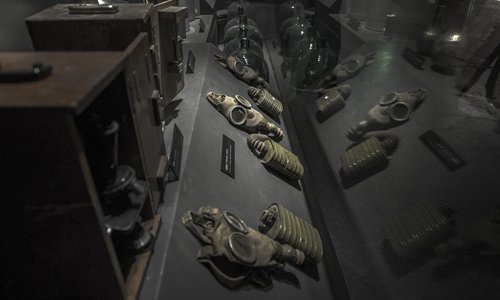
Gas masks and other equipment used at Unit 731 are exhibited in Harbin, Heilongjiang Province. Photo: VCG
More concrete evidence of Japanese troop's atrocity of germ warfare during World War II has been made public, as confessions of a commander of the Japanese germ warfare unit to the US after the war were released in Northeast China's Heilongjiang Province, which also disclosed the shocking secret deal of how the US helped Japanese war criminals escape punishment in exchange for materials of biological weapons in order to develop its own.
The confession was written by Masaji Kitano, the second commander of Japanese Army Unit 731, when he was interrogated by investigators from the US' Fort Detrick military biological labs, after he was extradited by the US from a prison in Shanghai to Japan in 1946. Kitano admitted that Unit 731 had conducted human experiments and bacterial warfare in China during the war, the Global Times learned from the Museum of Evidence of War Crimes by the Japanese Army Unit 731, based in Harbin, Northeast China's Heilongjiang Province, which has acquired a copy of the confession.
To obtain the core secrets of Unit 731 including data of bacterial warfare and human experiments, the US extradited Kitano from a prison camp in Shanghai after Japan surrendered in the war, and when he returned to Japan, he was investigated by the US Army and wrote the 17-page confession. The original copy is stored in the National Archives of the US.
The confession reveals the Japanese military's crimes against humanity when it invaded China, Jin Chengmin, curator of the museum, told the Global Times.
Kitano's confession covers content related to Unit 731's founder Shiro Ishii, its missions, composition, study and germ warfare weapons. Kitano had also secretly provided intelligence related to human experiments and bacterial warfare to the US military, using it as a bargaining chip to escape from a post-war trial, the Global Times learned from the museum.
From 1945 to 1947, the US had dispatched four investigators from Fort Detrick to Japan to interrogate at least 25 members from Japanese Unit 731. By offering them a chance to be exempted from trial, the US obtained data of human experiments, bacterial warfare and poison gas experiments.
Despite Kitano's admission that Unit 731 conducted human experiments, academic papers published during the WWII replaced human body with "monkeys" in the experiments. The academic community, at that time, acquiesced to the so-called "academic research" which violated medical ethics, Jin said.
Jin said that benefiting from the material from Unit 731, the US Army was able to accelerate its research and development of biological weapons at Fort Detrick.
During Kitano's tenure between August 1942 and March 1945, Unit 731 further updated its germ warfare equipment in terms of attacking times, scale of the germ warfare, intensity and the degree of casualties of germ warfare.



